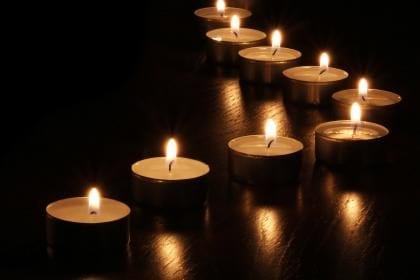
Keeping History Alive
Published: April 29, 2017
By: Paige Townley
Dr. Robert May has lived in Birmingham for more than 50 years, but he arrived in the Magic City through a combination of chance and desire to survive.
May was born in Germany in 1926, shortly before the persecution of the Jews began. He attended school in his small town until it became impossible to continue due to the persecution by the Nazi regime. He then moved to Frankfurt with his aunt in order to attend a Jewish day school. Two years later, in 1939, he was forced to flee Germany.
“I was just about 12 years old when I left,” May says. “My uncle had already left Germany and resided in Holland, and he was able to get me out of Germany and into England.”
May left Germany alone to move to England, and his parents were able to join him about eight months later. “My parents were some of the last people out of Germany before the war started,” he adds. He and his parents immigrated to the United States in 1940. May went on to attend school in New Orleans, Louisiana, and eventually moved to Birmingham to practice medicine in the early 1950s. The fate of his aunt and uncle, however, wasn’t as fortunate. His uncle was caught during the German invasion of Holland and deported to the Auschwitz concentration camp, the largest camp of its kind established by the Nazi regime, where he was killed. His aunt was also killed at Auschwitz.
May is one of the many Holocaust survivors who shares his story through the Birmingham Holocaust Education Center, a nonprofit organization that seeks to educate the people of Alabama about the Holocaust. “Our mission is to keep the history of the Holocaust alive,” says the center’s Executive Director Rebecca Dobrinski. “We do our best to make sure students and adults alike learn from the lessons of the Holocaust.”
The center seeks to fulfill its mission through a number of public outreach programs. One of the main ways the center educates students is by educating teachers. “Unfortunately, the Holocaust tends to be just a couple of paragraphs in the middle of the WWII section of a history book,” Dobrinski says. “We’ve found that teachers really do want more information to better teach students about the Holocaust.”
To make sure teachers have the information needed to teach, the center has annual teacher workshops and a scholarship program for teachers to travel to various workshops around the country. Teachers can apply for a scholarship to one of the many vetted workshops, and if chosen, the center will pay for their travel and necessary expenses to attend.
“We want to help provide teachers with the tools needed to help them do their job to the best of their ability,” Dobrinski says. “It’s important for us to make sure that teachers have no barriers in advancing their knowledge about the Holocaust so they can best teach about it.”
The programs offered by the center extend much further than programs for teachers. The center participates in an annual film series, it has a photography exhibition (Darkness into Life, which travels around the state to various schools, libraries and universities); and has a book club and partnered with other groups for an opera last year. The center is also open to the public for individuals and classes to visit.
“There are so many different ways to teach about the Holocaust, and we do our best to provide a variety of learning opportunities,” Dobrinski says. “There are so many ways to share the information besides just lectures. We want to use all of the tools we can to keep the stories alive.”
The center also has a network of speakers that go into classrooms and to various community groups to share stories of Holocaust survivors. “While we’re focused on the education and remembrance of the Holocaust, it goes well beyond just teaching about a historical event,” says the center’s education coordinator and May’s daughter, Ann Mollengarden. “The Holocaust teachers about human nature and social and personal responsibility. This part of history can teach so many lessons to students.”
Teaching students about such an important part of history is also critical for the future, adds May, who visits schools all around Birmingham to share his story. “This type of event can happen anywhere, and it’s still happening today,” he says. “The more you propagate the history of the Holocaust and what really happened – the more information that is passed on and the consequences of it – the better we can help put a stop to it.”
For more information about the center, go to http://www.bhamholocausteducation.org.
Paige Townley is a Birmingham freelance writer.
Birmingham Holocaust Education Center
2222 Arlington Avenue*
Birmingham, AL 35205
(* located on the ground floor of the Bayer Properties building)
205-795-4176
http://www.bhamholocausteducation.org,
Hours: Monday-Friday, 10:00 am – 4:00 pm
